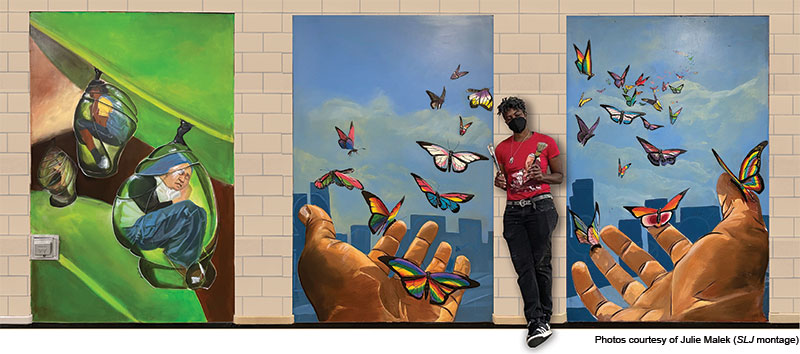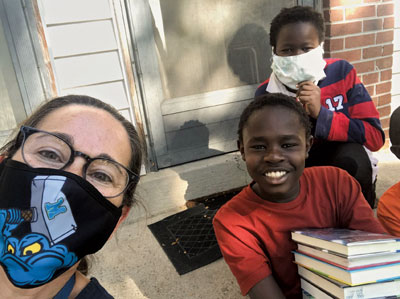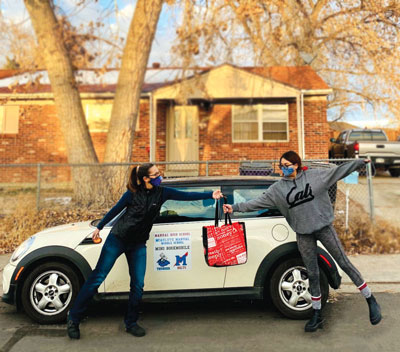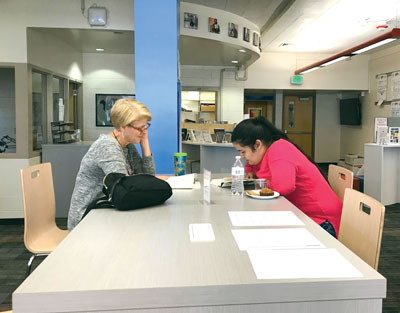School Libraries 2021: Fostering Relationships Between Students and Community Members
In schools big and small, programs and partnerships with community members benefit everyone. Here's what some librarians are doing.


|
SPECIAL REPORT A Pandemic Tale in Pictures |
The mural at McAuliffe Manual Middle School and Manual High School in Denver tells the story of students safely ensconced in cocoons before hands release them into the world as butterflies. Each butterfly is painted in colors that represent members of the LGBTQ+ community.
The concept was conceived by students members of the schools’ Gay Straight Alliance (GSA), who teamed with local artist Adri Norris to create the mural at the schools’ shared building during the last pandemic-disrupted year.
Norris, who has done many projects with schools, was impressed with the students’ idea and how they viewed their school.
“I was pleasantly surprised to find out they felt supported in their school, especially a school that is predominantly Black and brown kids,” says Norris. “The fact that these kids really felt they were being supported, protected, and honored for who they were was massive.”
Librarian Julie Malek helps foster that strong sense of support. Malek, also the schools’ innovation lab coordinator and middle school GSA adviser, coordinated creation of the three-panel mural despite school being remote at the time.
“It’s just beautiful,” she says of the finished art installation.
Malek, who graduated from Manual High, reached out to the community to find a queer artist who could assist with the project.
“Our school is in the center of the city, and it feels really important that our students be exposed to what is literally out their door, but what they don’t necessarily have access to,” says Malek. “To have this woman, who happened to be a Black queer artist, in a school that’s 95 percent students of color, is a powerful statement. I thought it was really valuable for them to see the possibility. This, this person, is an example of what’s possible.”
 |
When the school building was closed, Julie Malek, left, delivered books to students’ homes.Photos courtesy of Julie Malek |
Librarians hold a unique role in schools that allows them flexibility and the opportunity to connect students not only to books, but also to technology, critical thinking skills, and the community. In schools big and small, creating relationships with community members benefits the students. Malek is one of many librarians across the country reaching beyond campus.
Amanda Smithfield, librarian at Hume-Fogg Academic Magnet High School in Nashville, TN, partnered her students with the Nashville Public Library for a Youth Civic Engagement Fair, where community members spoke to students about various issues, including gun control. Smithfield’s students have also participated in a public voter registration drive, something 2020 School Librarian of the Year Cicely Lewis has done with her students, who also provided water and hand sanitizer to those standing in line to vote in the 2020 presidential election.
In Hawaii, 2021 School Librarian of the Year Diane Mokuau runs the Molokai College and Career Tour Club. The program takes high school students from the island of Molokai to visit colleges on the mainland. As part of the initiative, Mokuau connects her students with former island residents who can share what it’s like to attend school so far away. They talk about being homesick, living with snow, and representing their families and island communities at college. It helps current students see the possibilities and opportunities, and, at the same time, enables alumni to give back and connect to the next generation.
 |
Malek turned her car into a bookmobile to deliver titles to students during remote learning. |
These activities give adults the opportunity to interact with students, offering them a personal connection to the kids and school that they might not otherwise have.
In Denver, the mural is just one of many ways Malek has fostered relationships between students at the middle and high schools and local citizens.
“While Manual has a storied history, its more recent narrative is not always positive,” says Manual High School assistant principal Douglas Clinkscales. “We have been working on changing that narrative since 2011, and the best way is to get community [members] into the building and tell them about the good work we are doing.”
Unlike financial donations, Clinkscales notes, Malek’s programming gives people a chance to share their passions and expertise, meet students, and impact lives directly and personally.
“The community is invested,” says Malek. “The more you bring people into the building and they see what’s happening, the more invested they become. We need that partnership. The students need that partnership. And the teachers need that support.”
One of Malek’s larger, most impactful initiatives is the Reading Partners program. Malek didn’t come up with the idea, but since an assistant principal asked her to run it, she has created a life-changing experience for students and adult volunteers.
Reading Partners pairs a student who has signed up for the program with an area adult who comes in after school to read books with the student once a week.
Malek helps students select possible books to read, and the volunteer and student pick one in the first week, then read aloud to each other, alternating by chapter or page. Volunteers need to be patient listeners and show interest in their student partners, says Malek. The goal is to build the child’s confidence in reading, but the program has become much more.
“For them, talking to an adult outside of teachers and their own families is often a new experience,” she says. “A lot of times, it leads to other things.”
When she can, Malek tries to bring in volunteers of color. One, a Black engineer, came in to help with the school makerspace and 3-D printer. It’s all part of Malek showing her students what can be possible for them.
Another volunteer knew a student was interested in aeronautics. When she learned of an opportunity at work that was related, she took him to a lecture on the subject.
“That happened because she had built a relationship with this kid,” says Malek.
And one volunteer attended their student partner’s basketball game. “The kid knows this person is literally in the stands for them,” says Malek. “There’s so much power in those relationships.”
Malek’s friend and neighbor, Lisa Culhane, participated in the program for three years.
“It was less about a mentor-mentee relationship and more about developing a friendship,” says Culhane.
“What was amazing is they would hear that as a prolific reader, I made mistakes, too, when I read out loud,” Culhane says. “They didn’t have to do it perfectly. I wasn’t doing it perfectly. Sometimes I would stumble over a word or say, ‘I’m not exactly sure how to say that word, so I’m going to say it this way.’ Then we would talk about vocabulary. It’s a very nurturing way to build confidence and vocabulary.”
 |
The Reading Partners program paired volunteers from the community with students. |
Over the summer, the parent of a middle schooler reached out to the school. When the buildings closed in March 2020, Malek and her colleagues were each given a group of students to check in on. But Malek had not met rising eighth grader Gerold Waters III before his mother, Junae Brown, contacted the school to see if he could get any books from the library.
“It was like music to my ears,” says Malek.
Gerold loves to read, particularly physical books, and because he was logging so much screen time for remote learning, his mother didn’t want him reading ebooks. When Malek got the request, she thought, “Why can’t every kid get books from the library?” even if students weren’t in school at the time and, technically, the library wasn’t circulating its physical titles.
With that, Malek turned her Mini Cooper into a bookmobile.
“I drove all over the city,” she says. “It was really an eye-opener.”
She ordered magnets bearing the schools’ logos and created a Google form for students to choose titles from the library. If they wanted a book that wasn’t in the collection, she asked them to email her. She would purchase the title and add it to the collection when it was returned.
“It showed how much she cared, and I took that to heart,” says Gerold. “It was just amazing that she made time in her day to not only read the emails and reply and sometimes buy books, but to take her own time out of her day to drive over here and deliver the books.”
Brown agrees.
“It shows how passionate she is that the children have access to reading material,” she says. “I’ve never really had school personnel do something like that. She probably came twice a month. I feel like I really can’t repay her.”
 Malek brought more than reading material to some students. If someone wanted a book on origami, she also brought the paper. If they asked for a book on drawing, she added paper and markers to her delivery.
Malek brought more than reading material to some students. If someone wanted a book on origami, she also brought the paper. If they asked for a book on drawing, she added paper and markers to her delivery.
“A lot of our kids don’t have those resources,” she says.
About 25 percent of the students participated in the book delivery program. “That’s a quarter more than would have gotten books otherwise” while school was closed, Malek says.
Clinkscales watched the program with admiration.
“It was awesome,” he says. Malek also provided students with food and COVID-19 resources, according to Clinkscales. “Julie volunteers for any and everything.”
Adds Brown, “I think we need more Miss Julie Maleks. It’s not just a job for her. And the fact that she took her time, her personal time, to make sure that children had books to read, I think that speaks volumes.”
With Reading Partners, while the students’ reading improved, Culhane found herself deeply affected by the interactions.
“We often go into so many experiences with the idea that ‘I know what’s going on and I’m here to help you,’” she says. “So often, major teaching comes the other way. We learn more. I was there to help the student become a more proficient reader, but I often gained so much more from the experience. I left far better off than I came in.… These kids were my teachers.”
Reading The Hate U Give with one student had a particular impact on Culhane.
“It just opened up a whole new world for me,” she says. “I can’t understand what somebody in a different situation went through, but you can be empathetic. Getting to talk about it with somebody who did go through it, and hearing it in their voice, really opened my eyes. It gave me a layer of understanding that I lacked. And that layer is really important. It changed the way I interact with people.”
Kara Yorio is SLJ’s news editor. Wayne D’Orio contributed to this article.
RELATED
The job outlook in 2030: Librarians will be in demand
The job outlook in 2030: Librarians will be in demand
ALREADY A SUBSCRIBER? LOG IN
We are currently offering this content for free. Sign up now to activate your personal profile, where you can save articles for future viewing





Add Comment :-
Be the first reader to comment.
Comment Policy:
Comment should not be empty !!!